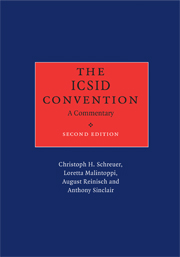Book contents
- Frontmatter
- Contents
- Foreword by Professor Sir Elihu Lauterpacht, CBE, QC
- Authors' preface to the second edition
- Table of cases
- List of abbreviations
- Text of the ICSID Convention
- Procedural calendar
- PREAMBLE
- CHAPTER I International Centre for Settlement of Investment Disputes
- CHAPTER II Jurisdiction of the Centre
- CHAPTER III Conciliation
- CHAPTER IV Arbitration
- CHAPTER V Replacement and Disqualification of Conciliators and Arbitrators
- CHAPTER VI Cost of Proceedings
- CHAPTER VII Place of Proceedings
- CHAPTER VIII Disputes between Contracting States
- Article 64 International Court of Justice
- CHAPTER IX Amendment
- CHAPTER X Final Provisions
- Final Clause
- Consolidated bibliography
- Index by article
- Index by subject
Article 64 - International Court of Justice
from CHAPTER VIII - Disputes between Contracting States
Published online by Cambridge University Press: 07 September 2010
- Frontmatter
- Contents
- Foreword by Professor Sir Elihu Lauterpacht, CBE, QC
- Authors' preface to the second edition
- Table of cases
- List of abbreviations
- Text of the ICSID Convention
- Procedural calendar
- PREAMBLE
- CHAPTER I International Centre for Settlement of Investment Disputes
- CHAPTER II Jurisdiction of the Centre
- CHAPTER III Conciliation
- CHAPTER IV Arbitration
- CHAPTER V Replacement and Disqualification of Conciliators and Arbitrators
- CHAPTER VI Cost of Proceedings
- CHAPTER VII Place of Proceedings
- CHAPTER VIII Disputes between Contracting States
- Article 64 International Court of Justice
- CHAPTER IX Amendment
- CHAPTER X Final Provisions
- Final Clause
- Consolidated bibliography
- Index by article
- Index by subject
Summary
The Jurisdiction of the International Court
Art. 64 deals with disputes between States parties to the Convention. Clauses in treaties providing for the settlement of disputes arising from the treaty by the International Court of Justice (ICJ) are common.
Art. 64 establishes the compulsory jurisdiction of the ICJ in the sense that no further agreement between the States parties to a dispute is needed. Art. 36(1) of the Statute of the ICJ states that “[t]he jurisdiction of the Court comprises … all matters specifically provided for … in treaties and conventions in force”. Art. 64 is such a treaty provision.
A clause providing for the ICJ's compulsory jurisdiction was contained in all drafts leading to the Convention (History, Vol. I, pp. 282, 284). This clause was opposed by some delegates and there was concern that it might lead to reservations to the Convention (History, Vol. II, pp. 279, 291, 292, 294, 438, 439, 440, 441, 443, 532, 577, 905/6). In the end, a vote showed a large majority in favour of retaining this clause (at p. 906).
Art. 64 has not attracted any reservation and it is doubtful whether reservations are admissible under the Convention (see Art. 68, paras. 3–5). But there is a declaration by Turkey expressing a preference for negotiations over third party settlement.
- Type
- Chapter
- Information
- The ICSID ConventionA Commentary, pp. 1258 - 1262Publisher: Cambridge University PressPrint publication year: 2009



